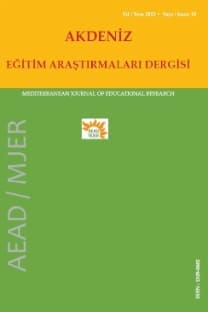Eğitim fakültelerinin sınıf öğretmenliği programlarının öğretmenlik mesleği genel yeterliklerini kazandırma düzeyi
Bu araştırma, eğitim fakültelerinin, Öğretmenlik Mesleği Genel Yeterliklerini (ÖMGY) kazandırma derecesini belirlemek amacıyla yapılmıştır. Araştırmada nicel boyutta veri toplama aracı olarak anket; nitel boyutta ise yarı yapılandırılmış görüşme ve gözlem formu kullanılmıştır. Araştırmanın evrenini beş üniversitenin eğitim fakülteleri sınıf öğretmenliği bölümlerinde öğrenim gören öğretmen adayları; örneklemini nicel boyutta 278 öğrenci, nitel boyutta ise 50 öğretmen adayı oluşturmuştur. Nitel boyutta 30 öğretmen adayı ile görüşme, 20 öğretmen adayı ile gözlem yapılmıştır. Verilerin analizi, nicel boyutta yüzde, frekans ve aritmetik ortalamalar hesaplanarak; nitel boyutta ise betimsel analiz yaklaşımıyla gerçekleştirilmiştir. Araştırmanın nicel bulgularının sonuçlarına göre öğretmen adayları, eğitim fakültelerinin ÖMGY’yi genel olarak “Oldukça” ve “Çok” düzeyinde kazandırdığı görüşündeyken; nitel boyutta yapılan görüşmelerde ise, ÖMGY’nin eğitim fakültelerinde “Yeterince Kazandırılmadığı” yönünde görüş belirtmişlerdir. Gözlemler sonucu adayların, gözlenebilir yeterlik maddelerinde de çoğunlukla yetersiz oldukları gözlenmiştir.
The degree to gain the generic competencies of teaching profession through the primary school teacher training curriculum in faculties of education
This study was conducted to determine the degree to gain the general teacher competencies in faculty of education. For the collection of the quantitative data, survey and for the collection of qualitative data, semi‐structured interview and observation form was used. Population of the research was consisted of prospective teachers studying classroom teaching at the faculties of education of five universities and its sample was consisted of 278 students for the quantitative data and 50 prospective teachers for the qualitative data. For the qualitative data, 30 prospective teachers were interviewed and 20 were observed. The quantitative data analysis was carried out by calculating the frequency and the arithmetic mean and qualitative data analysis was carried out with the descriptive analysis approach. According to the findings of the quantitative results of the prospective teachers, they think that faculties of education enable the students to gain ‘’GTCP’’ in a degree of ‘’quite’’ and ‘’very’’. However, according to the findings of the qualitative results obtained from the interviews, they stated that GTCP weren’t gained in an enough degree in the faculties of education. The results of the observations on the candidates showed that they were often not enough in the qualifying items that can be observable.
___
Acar, F. (2005). Eğitim fakültelerinin sınıf öğretmenliği programından mezun olan öğretmenlerin Türkçe, sosyal bilgiler, matematik ve fen bilgisi alan öğretimi yeterliklerinin belirlenmesi ve değerlendirilmesi. Yayımlanmamış doktora tezi, Gazi Üniversitesi Eğitim Bilimleri Enstitüsü Eğitim Programları ve Öğretim Bilim Dalı, Ankara.Adams P.H. and Krockover G.H. (1997). Concerns and perceptions of beginning secondary science and mathematics teachers. Science Education, 81, 29‐50.
Buchberger, F. , Campos, B. P., Kallos, D. , Stephenson J. (2000). Green paper on teacher educatıon ın europe. high quality teacher education for high quality education and training tematc netwwok on teacher educaation in europe. TNTEE and the Editors.
Budak,Y. (2009). Mesleki eğitimde ihtiyaç analizi ve işlevsel eğitim programı. Endüstriyel Sanatlar Eğitim Fakültesi Dergisi, 65 (75‐85).
Budak,Y. (2011). Image of ideal teacher at Turkish young teacher candidates. International Jornal of Edcational Reform, 20 (15‐25).
Celep, C. (2004). Meslek olarak öğretmenlik. Anı Yayıncılık, Ankara.
Dewalt, M. and Ball, D. W. (1987) Some effects of training on the competence of beginning teachers. Journal of Educational Research, 80 (6), 343‐47.
Gökçe, E. (1999). İlköğretim öğretmenlerinin yeterlikleri. Yayımlanmamış doktora tezi, Ankara Üniversitesi Sosyal Bilimleri Enstitüsü, Ankara.
Gökçe, E. (2000). Yirmibirinci yüzyılın öğretmeni. Çağdaş Eğitim Dergisi, Cilt: 270, 21‐26.
Gürkan, T., Gökçe, E. (1999). Türkiye’de ve çeşitli ülkelerde ilköğretim. Siyasal Kitabevi. Ankara.
Karasar, N. (2009). Bilimsel araştırma yöntemi. Nobel Yayıncılık, Ankara.
Kavcar, C. (2002). Cumhuriyet döneminde dal öğretmeni yetiştirme. Ankara Üniversitesi Eğitim Bilimleri Dergisi. 35, 1, 1‐14.
Küçükahmet, L. (2000). Öğretmenlik mesleğine giriş. Ankara: Nobel Yayınları.
Malm, B. (2009). Towards A new professionalism: Enhancing personal and professional development in teacher education. Journal of Education for Teaching. 35, 1, 77–91.
Myers,D. (1973).Teacher power. Lexington, Mass.: Lexington Books.
Navarro, J.C. (2000). The teaching profession‐beyond training. Techknowlogia,November/December http://www.techknowlogia.org/TKL_active_pages2/CurrentArticles/main.asp?IssueNumber=8&FileType=HTML&ArticleID=206 adresinden 15 Mayıs 2010 tarihinde erişilmiştir.
NCATE (2002). Professional standarts for the accreditation of schools, colleges, and departments of education. Wasington: Copyright. University Of Virginia.
NcNess, E., Broedfoot, P., Osborn, M. (2003). Is the effective ompromising the affective? British Educational Research Journal. 29(2).243‐257.
OECD (2004). Learning for tomorrow’s world of first results from PISA 2003. The learning environment and organisation of schooling.
Özdemir, A. (2005, 22‐24 Eylül). Öğretmen Yetkinliğinde Hizmetiçi Eğitim. Gazi Üniversitesi, Gazi Eğitim Fakültesi, Eğitim Fakültelerinde Yeniden Yapılandırmanın Sonuçları ve Öğretmen Yetiştirme Sempozyumuʹnda sunuldu, Ankara.
Özdemir, S., Yalın, H.İ. (1998). Her yönüyle öğretmenlik mesleği. Ankara, Nobel Yayın Dağıtım.
Rice, J. K. (2003). Teacher quality understannding the effectiveness of teacher attributes. Washington: Economic Policy Institute.
So, W., Cheng, M., Tsang C. (1996). An impact of teaching practice: Perceptions of teacher competence among student‐teachers. Journal of Primary Education V. 6 No, 1 – 2
Sönmez, V. (2000). Programlandırılmış öğretimle öğretmen yetiştirme. Eğitim Araştırmaları Dergisi. 1(1) s.1‐8
Şahin, A. E. (2006). Meslek ve öğretmenlik. V. Sönmez (Yay. Haz.), Eğitim bilimine giriş içinde (ss. 261‐306). Ankara: Anı Yayıncılık. 1(1), s.47‐54
Whitaker, T. (2006). Study guide. what great teachers do differently 14 things that matter most. Larchmont: eye of education.
Taşdemir, M. (1995). İlkokul öğretmeni yetiştirme programının öğretim elemanı, öğretmen ve öğrenci görüşlerine göre değerlendirilmesi. Yayımlanmamış Doktora Tezi, Hacettepe Üniversitesi, Sosyal Bilimler Enstitüsü, Ankara.
Tezcan,M. (1997). Eğitim sosyolojisi. Ankara: Zirve Yayınevi.
Varış,F. (1973). Cumhuriyetin 50. yılında türkiye’de öğretmen yetiştirmede karşılaşılan birkaç sorun 50.yıla armağan. Ankara: A.Ü. Eğitim Fakültesi
- ISSN: 1309-0682
- Yayın Aralığı: Yılda 4 Sayı
- Başlangıç: 2008
- Yayıncı: Tayfun Taşbilek
Sayıdaki Diğer Makaleler
Lise düzeyindeki okullarda yönetici ile öğretmen iletişimi: Dance sarmal iletişim modeli
Okul Temelli yönetim girişimlerinin niteliğini anlamaya yönelik bir çalışma
BİNALİ TUNÇ, Tuncer BÜLBÜL, GÜVEN ÖZDEM
Büyük Kas Motor Gelişim‐2 (TGMD‐2) testinin Türk çocuklarına uyarlama çalışması
